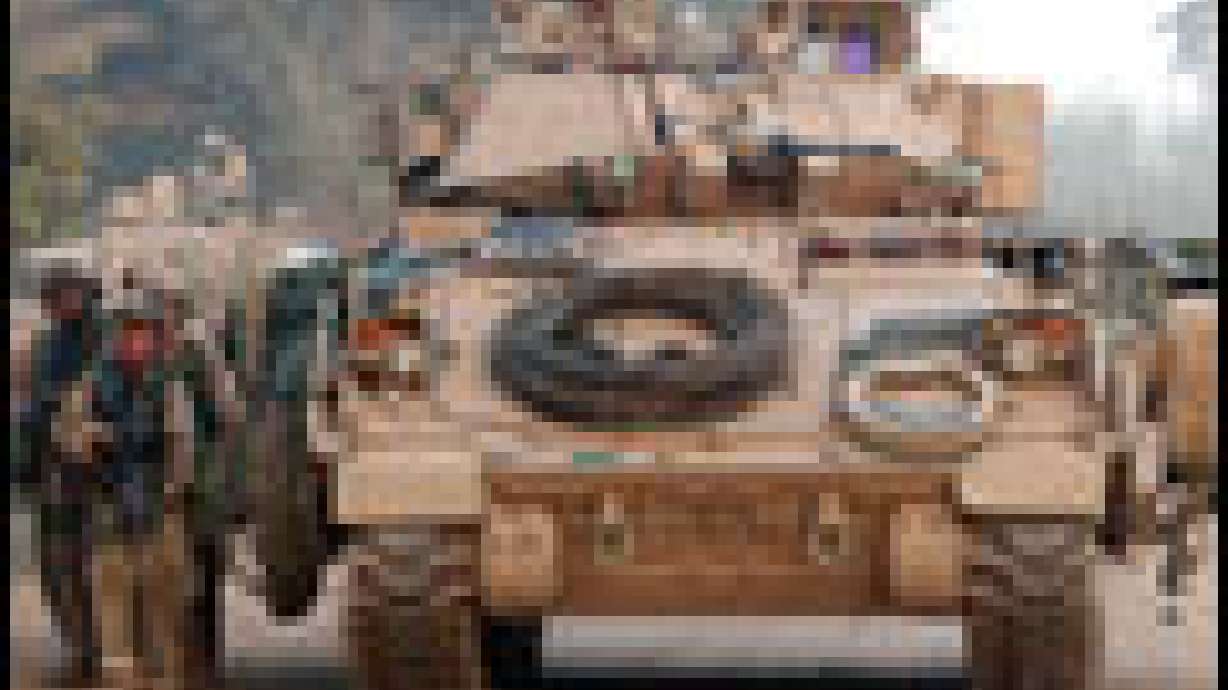Estimated read time: 4-5 minutes
This archived news story is available only for your personal, non-commercial use. Information in the story may be outdated or superseded by additional information. Reading or replaying the story in its archived form does not constitute a republication of the story.
IRBIL, Iraq (AP) -- Iraqi Kurds flooded the streets of northern Iraq on Wednesday, rejoicing in the downfall of President Saddam Hussein -- a leader who had gassed them and executed them by the thousands.
"He's gone! He's gone!" chanted a group of boys dancing in stalled traffic. As news spread that U.S. troops had overtaken the Iraqi capital of Baghdad, Kurds left their homes and waded onto streets, waving streamers and the yellow starburst flag of their autonomous region.
But fighting in the north was not over, and strategic oil fields near the cities of Mosul and Kirkuk remained under Iraqi control.
Backed by U.S. Special Forces and American-led warplanes, Kurdish fighters took a strategic peak near Mosul and were just outside Kirkuk, but it wasn't clear when coalition troops would attack those key areas.
That did not stop tens of thousands of Kurds from basking in the moment of Baghdad's fall to coalition troops.
In the Kurdish administrative capital of Irbil, joy came in many guises. Car horns blared. Boys waved hand-drawn American flags. Militiamen held their weapons overhead.
People burned newspaper photos of Saddam. One car windshield carried a message written in soap: Bye Bye, Saddam. A cartoon showed Saddam falling into a garbage bin.
"There is joy today, but let's not forget we've all shed tears because of Saddam," said actor Uman Chowshin. "We cannot never forget what he's done to us."
Saddam's regime has long oppressed the 4 million Kurds living in northern Iraq, despite occasional alliances of convenience between Kurdish leaders and Saddam's regime. In the late 1980s, more than 150,000 Kurds are believed to have been killed by the Iraqi leader's orders. In 1988, in the town of Halabja, a poison chemical attack wiped out an estimated 5,000 residents.
In the eastern Kurdish city of Sulaymaniyah, hundreds gathered in a central square and chanted: "George Bush! George Bush!" Special Forces were cheered as they drove past. Some Kurds tried to hug and kiss them.
In Irbil, about a dozen boys tried without success to sing "The Star Spangled Banner."
Street celebrations erupted a few hours after a significant northern battlefield victory.
Special Forces and Kurdish fighters captured an Iraqi radar and communications center perched on a mountain summit 10 miles northeast of Mosul.
Coalition aircraft struck the peak -- where Iraqis had directed air defense systems -- to ease the way for Kurdish ground forces who fought amid limestone crags near a Syrian Orthodox monastery from the 4th century.
"From our perspective it was the most important gain and development so far," said Hoshyar Zebari, a leader of the Kurdistan Democratic Party, one of two Kurdish factions controlling the northern region. "This shows the crumbling of the northern front."
At U.S. Central Command headquarters in Qatar, Brig. Gen. Vincent Brooks told reporters that special operations troops and Kurdish soldiers seized a small town north of Mosul and captured 200 fighters. He did not name that town or another Iraqi position 20 miles south of Irbil where he said special operations forces and aircraft destroyed tanks and cargo trucks.
Kurdish commander Sarbast Barbiri said remnants of the Iraqi Republican Guard and the fedayeen may remain near Mosul, but regular army units had been overrun.
Kurdish forces were also within sight of Kirkuk, the center of Iraq's second-largest oil region.
Ares Abdullah, a front-line commander of Kurdish forces near Kirkuk, said there were no immediate plans to move into the city.
Military progress in the north has been cautiously slow.
Turkey has refused to allow a mass deployment of U.S. forces across its border into northern Iraq, forcing American military officials to order some 1,200 soldiers to arrive by parachutes.
Those numbers are too small for a full-scale invasion, but Abrams tanks and Bradley fighting vehicles have reportedly arrived a northern air base recently taken by American troops and could provide more aggressive moves against remaining Iraqi defenses.
Claiming Mosul and Kirkuk would leave just one unfinished military objective in northern Iraq -- capturing Saddam's hometown of Tikrit.
On Tuesday, U.S.-led forces were "actively engaging" Iraqi forces in Tikrit, according to Lt. Mark Kitchens, a U.S. Central Command spokesman.
(Copyright 2003 by The Associated Press. All Rights Reserved.)








